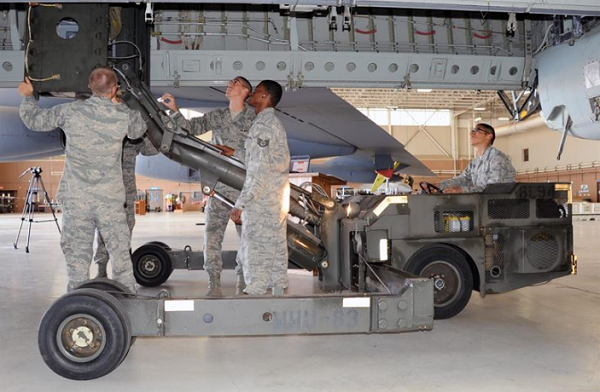Air Force Aircraft Armament Systems (2W1X1) have the important role of making sure everything is in working order when an explosive device is launched from a plane.
These specialist maintain the launch and release devices on aircraft.
They test new weapons, load ordnance, test releases and more.
Education, Qualifications and Training
While this is considered an entry-level position, there are some experience requirements as well as different ASVAB requirements.
Education
Individuals must have a High School Diploma or GED.
They must complete both the Mechanical and Electronics requirements on the ASVAB test.
Qualifications
Individuals who wish to join in the Aircraft Armament Systems position must:
- Complete a National, Local and Credit agency check
- Cannot have color blindness, or a record of emotional instability
- Have normal depth perception
- Have experience loading and unloading munitions
- Be between 17 and 39 years old
Related Article – Air Force Grooming Standards: Haircuts, Mustaches, Beards, And More
Training
After passing all physical exams, health exams and meeting the requirements, individuals will attend Basic Military Training for 8.5 weeks.
Recruits will attend Technical School at Sheppard Air Force Base in Texas for anywhere from 45 to 86 days.
Air Force Aircraft Armament Systems Job Duties
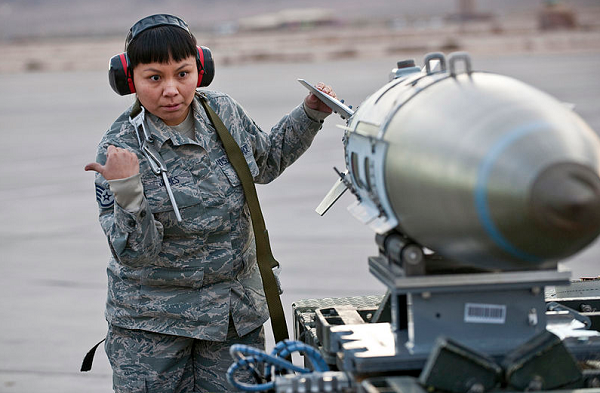
Aircraft Armament Systems specialist inspect, repair and maintain all aircraft release, launch, monitor and suspension systems.
This includes any aircraft guns or related equipment.
Aircraft Armament Systems job duties include participating in the testing and evaluating of new and prototype weapons and weapon systems.
Inspections
The specialist remove, dissemble and inspect any parts that may be damaged.
Individuals visually inspect for any defects or inaccurate installations of system components.
These components can include loading and suspension devices, shackles, ejector racks, rocket pods, ammunition, pylons, feed chutes, boosters and more.
After-firing inspections are performed for defect identification on aircraft guns.
When removing and inspecting parts or sub-assemblies, they will be evaluated for damage, rust, corrosion or other issues.
Munitions and Launch Testing
They may load, position or unload munitions on aircraft.
Specialist will do this by preparing the munition, inspecting it and operating handling and loading equipment.
They will use procedures relating to proper handling, loading and checking out for all equipment.
Aircraft Armament Systems specialist work to make sure that when the pilot fires the trigger, the release system actually releases the ordnance.
They will test both the weapons release and the gun systems on aircraft.
The suspension and release systems will be tested for retentive locking and checking for issues with manual and electronic releases.
They can disassemble, replace or repair any mechanical, electrical or pneudraulic mechanisms that are related to launch and release.
The lubricants and preservatives will be adjusted and applied as needed.
Related Article – Air Force Aviation Resource Management (1C0X2): Career Profile
Electrical
Specialist test the electrical systems on the plane.
They look for electronic circuitry for proper operation including continuity and voltage.
Prior to connecting any electrically motivated explosives or propellants, individuals will test for any signs of unwanted power or electric signal.
To confirm that there are not inadvertent detonation, launching or firing of munitions or gun systems, Armament Systems specialist will install ground safety devices.
They will also insert and remove impulse cartridges that are associated with pylons and fuel tanks.
Individuals will adjust and install conventional munitions fuses, boosters and delay elements.
Other Job Functions
They will monitor the aircraft systems and improve on efficiency.
In addition to improving efficiency, they will determine the alteration effects that are likely from current and future maintenance problems.
After the aircraft has been serviced, the Aircraft Armament Systems specialist will perform serviceability tests on all equipment.
They evaluate the operational efficiency and make any recommendations/modifications.
Individuals plan, schedule and conduct armament system maintenance activities.
This includes checking methods and techniques for any possible improvements on loading/unloading munitions and repairing equipment.
What is the Pay for an Aircraft Armament Systems Specialist?
Like all jobs in the Air Force, the pay for an Aircraft Armament Systems specialist will vary based on the education and experience you join with.
This position does require some experience working with loading and unloading munitions.
The education or experience may increase your rank.
Related Article – Joining The Military After College: How To Do It The “Right” Way
Your base pay will be determined by your rank and years of service.
You can use the table below to estimate where you would start, keeping in mind you would start as E-1 with zero additional experience and education (excluding the required ones).
| Insignia | Pay Grade | Rank | Abbreviation | 2023 Minimum Monthly Pay |
|---|---|---|---|---|
| E-1 +4 months | Airman Basic | AB | $1,917.60 | |
| E-2 | Airman | Amn | $2,149.20 | |
| E-3 | Airman First Class | A1C | $2,259.90 | |
| E-4 | Senior Airman | SrA | $2,503.50 | |
| E-5 | Staff Sergeant | SSgt | $2,730.30 | |
| E-6 | Technical Sergeant | TSgt | $2,980.50 | |
| E-7 | Master Sergeant | MSgt | $3,445.80 | |
| E-8 | Senior Master Sergeant | SMSgt | $4,957.20 | |
| E-9 | Chief Master Sergeant | CMSgt | $6,055.50 | |
| E-9 | Command Chief Master Sergeant | CCM | $6,055.50 | |
| E-9 | Chief Master Sergeant Of The Air Force | CMSAF | $6,055.50 |
Benefits
You might not think that the base pay for an E-1 is that high, but you have to take into consideration all of the benefits that are offered to airmen.
In addition to your pay you will receive housing and food allowances, also know as basic allowance for housing.
Find out exactly how much BAH you’d receive using our calculator here.
You will also receive free or low-cost medical and dental.
Airmen have paid sick time, 30 days paid vacation and low life insurance options.
All of these benefits are ones that outside of the military, could be very expensive and would generally come out of your pay.
Other benefits that the Air Force offers include:
- Retirement
- Education Tuition Assistance
- Recreational Access
More information can be found on the Air Force website here.
Job Reviews
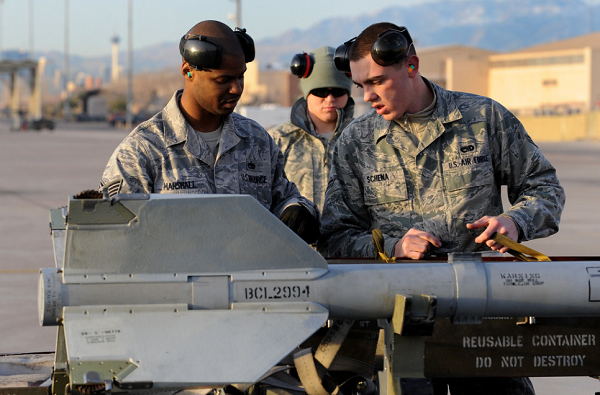
More than one job review of this position includes that the job is challenging, but worth it.
Individuals like the work that they do and the knowledge they gain from the position.
Most negative comments are geared towards long deployments and long hours.
You can find a few job reviews below:
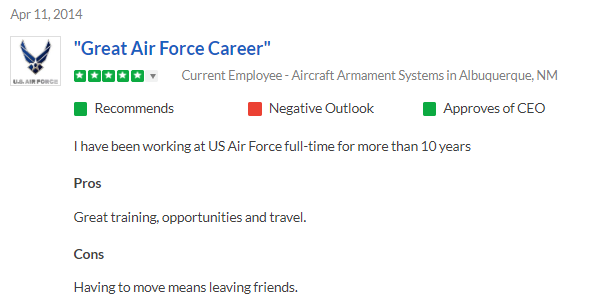
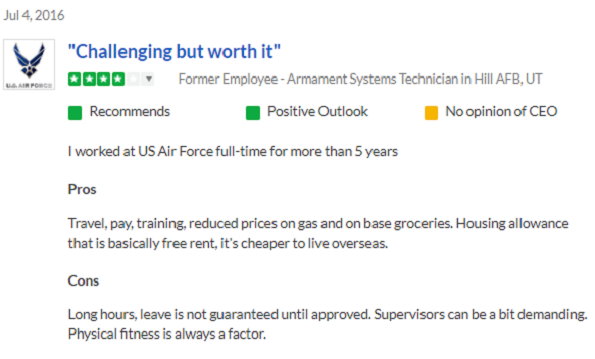
Civilian Job Opportunities
Previous experience in Aircraft Armament Systems will give you the training required to work in the aviation industry as a civilian.
Specific job titles include:
- Aircraft Mechanic
- Flight Line QC Inspector
- Flight Operations
- Circuit Card Testing
- Armament Systems Repairer
Aviation positions are not available everywhere.
Sometimes you have to move to a location that has a large aviation industry to find work.
Once you do, positions with similar job functions as an Aircraft Armament Systems specialist generally pay well and have good benefits.
Related Article – The Ultimate Guide To Becoming A Private Military Contractor
Summary
Air Force Aircraft Armament Systems specialist are responsible for identifying, maintaining and repairing aircraft launch systems.
These specialist will complete inspections, munitions and launch testing, electrical work and other job functions.
To get into the Air Force in this position you must meet the minimum education requirements and qualifications.
This is an enlisted position that grants basic pay and benefits.
Most individuals who have held this job like the actual work that they perform.
Gaining experience in the Air Force in this position will allow for several civilian career opportunities in aircraft maintenance.
References:
Air Force Aircraft Armament Systems
- Replacing Dog Tags: 6 Things You Need to Know - June 28, 2024
- Navy OAR Test Study Guide - June 24, 2024
- 10 Best Sniper Movies of all Time - June 20, 2024
Originally posted on September 13, 2019 @ 3:47 am
Affiliate Disclosure: This post may contain affiliate links. If you click and purchase, I may receive a small commission at no extra cost to you. I only recommend products I have personally vetted. Learn more.
